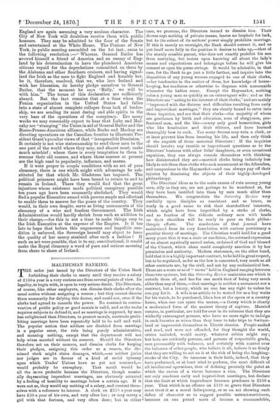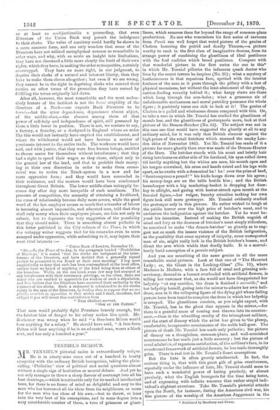MALTHUSIAN BANKING.
THE order just issued by the Directors of the Union Bank forbidding their clerks to marry until they receive a salary of 2.150 a year is a very curious one from several points of view. Its legality, to begin with, is open to very serious doubt. The Directors, of coarse, like other employers, can dismiss their clerks after the usual notice without assigning a reason ; but they cannot dismiss them summarily for defying this decree, and could not, even if the clerks had agreed to concede the power. No contract in contra- vention of public policy or good morals is valid, and as the realm requires subjects to defend it, and as marriage is supposed, by men less enlightened than Directors, to protect morals, contracts prohi- biting marriage have been repeatedly held to be null and void. The popular notion that soldiers are disabled from marriage is a popular error, the rule being purely administrative, and meaning nothing, except that the department will not help wives married without its consent. Should the Directors therefore act on their menace, and dismiss clerks for keeping their pledges, assigning this order as a reason, the dis- missed clerk might claim damages, which,—as neither juries nor judges are in favour of a kind of social tyranny upon which Trades' Unions have as yet not ventured,— would probably be exemplary. That result would be all the m3re probable because the Directors, though nomin- ally deprecating imprudent marriages, are obviously actuated by a feeling of hostility to marriage below a certain age. If it were not so, they would say nothing of a salary, and content them- selves with a reference to income. A clerk on £150 a year may have 150 a year of his own, and very often has ; or may marry a girl with that fortune, and very often does ; but in either case, we presume, the Directors intend to dismiss him. Their decree says nothing of private means, leaves no loophole for luck,
but to the extent of its authors' power simply prohibits marriage.
If this is merely an oversight, the Bank should correct it, and so put itself more fully in the position it desires to take up,—that of the sternly sensible parent, who does not exactly prohibit his son from marrying, but insists upon knowing all about the lady's means and expectations and belongings before he will give his consent or open his purse-strings. It would be advisable, in that case, for the Bank to go just a little farther, and inquire into the disposition of any young woman engaged to one of their clerks,
—her tendencies in the matter of dress, her knowledge of house- keeping, her readiness or otherwise to dispense with nursemaids whenever the babies come. Except the Haymarket, nothing ruins a young man so quickly as an extravagant wife ; and as the Directors are "acting in the interest of their clerks," and are mainly "impressed with the distress and difficulties resulting from early and improvident marriages," they are clearly bound to enter into those inquiries, and see that their clerks—the majority of whom are gentlemen by birth and education, sons of clergymen, pro- fessional men, and the like—marry only good housewives, girls who like bombazine and drab ribbons, and have learned thoroughly how to cook. Too many dresses may ruin a clerk, or at least prevent him from insuring his life, and then only think of the anguish of those maternal Directors ! If the inquiries should involve any trouble or impertinent questions as to the Directors' business with other folks' daughters, or even occasional expulsion, they can always console themselves with thinking how disinterested they are—married clerks being infinitely less likely to rob them than clerks who seek amusement at the Alhambra, and companions in the Haymarket—and can always pay off their injuries by dismissing the objects of their highly-developed philanthropy.
The Directors' ideas as to the main causes of ruin among young men, silly as they are, are not perhaps to be wondered at, for they have been instilled into them by men much abler than themselves. We congratulate the Saturday Review very cordially upon disciples so consistent and so brave, so ready in a good cause to risk their shareholders' interests, which might have been imperilled by a strike of clerks, and so fearless of the ridicule ordinary men with heads on their shoulders will be ready to pour on their philan-
thropic efforts. The conductors of that journal have maintained from its very foundation with curious persistency a peculiar theory of marriage. The Christian world held for a good many years that it was a state or condition, the outward expression of an almost mystically sacred union, ordained of God and blessed of the Church, which alone could completely sanction it by her permission and authority. Modern statesmen, on the other hand, hold that it is a highly important contract, to be held in great respect, but to be regulated, as far as the law is concerned, very much as all other contracts are, by the civil, and not by any ecclesiastical law. There are a score or so of " views" held in England ranging between those two systems, but the Saturday Review maintains one which is outside them all, and has for one merit that of being very much older than any of them,—that marriage is neither a sacrament nor a contract, but a luxury, which no one has any right to unless he can pay for it. A wife is an article to be waited for as a boy waits for his watch, to be purchased, like a box at the opera or a country house, when one can spare the means,—a theory which is clearly a modernized form of the ancient theory of capture. Married curates, in particular, are told for ever in its columns that they are wickedly extravagant persons, who have no more right to indulge in such luxuries as wives than they have to take trips to Switzer- land or impoverish themselves in Elzevir classics. People smiled and read, and were not offended, for they thought the world, critics included, would marry, whatever critics might say ; but here are evidently persons, and persons of respectable grade, men presumably with balances, and certainly with control over the balances of other people, who believe it all, believe it so firmly that they are willing to act on it at the risk of being the laughing- stocks of the City. So immense is their faith, indeed, that they have performed, or at least tried to perform, the most difficult of all intellectual operations, that of defining precisely the point at which the excess of a virtue becomes a vice. The Directors not only condemn early and improvident marriages, but declare that the limit at which imprudence becomes prudence is 2.150 a year. That which is an offence on £149 so grave that Directors must treat it as a moral delinquency, or as an act showing such defect of character as to suggest possible untrustworthiness, becomes on one pound more of income a commendable,
or at least so unobjectionable a proceeding, that even Directors of the Union Bank may permit the indulgence to their clerks. The value of casuistry could hardly be shown in a more concrete form, and one only wonders that some of the Directors have not utilized metaphysical acumen so remarkable in other ways, and why, with so acute an insight into limitations, they have not discerned a little more clearly the limit of their own rights, which they have, in making the order retrospective, certainly overstepped. They have no more right, in our judgment, to deprive their clerks of a natural and inherent liberty, than they have to make them slaves altogether ; but even if we are wrong, they cannot be in the right in depriving clerks who entered their service on other terms of the promotion they have earned by fulfilling the terms originally laid down.
After all, however, the most remarkable and the most melan- choly feature of the incident is not the borne stupidity of the directors of a Bank—one expects Bank Directors to be boras—but the utter dependence, dependence almost abject, of the middle-class,--the absence among them of that power of self-help and independence of spirit, still possessed by those a little lower in position. There is not, we venture to say, a factory, a foundry, or a dockyard in England where an order like this would not instantly have emptied the establishment, and where its withdrawal would not have become a matter of passionate interest to the entire trade. The workmen would have said, and with justice, that they were free human beings, entitled to choose mates for themselves without interference ; that they had a right to spend their wages as they chose, subject only to the general law of the land, and that to prohibit their marry- ing at their own discretion in order to make them econo- mical was to revive the Truck-system in a new and far more oppressive form ; and they would have succeeded in their resistance, and the masters would have been condemned throughout Great Britain. The lower middle-class unhappily be- comes day after day more incapable of such manliness. The pressure of competition, the necessity of obtaining a livelihood, the cares of relationship become daily more severe, while the good word of the last employer means so much that a transfer of labour is becoming almost impossible, and educated men, told that they shall only marry when their employers please, are fain not only to submit, but to deprecate the very suggestion of the possibility that they should resist. There is something almost pathetic in this letter published in the City column of the Times, in which the unhappy writer suggests that for his comrades even to seem annoyed under oppression, while submitting to it, may injure their most vital interests :—
"Union Bank of London, December 17.
"Sir,—In the Tunes of to-day, in the paragraph headed Prohibition of Marriage,' it is stated that the clerks are indignant at the inter- ference of the Directors, and have decided that a generally signed protest be presented to the Board at their next meeting.' I beg most emphatically to deny that such has been contemplated at the head office, neither have we heard of anything of the kind being done at either of the branches. While, on the one hand, some few may feel annoyed at any interference with their customary privilege, on the other, there are many who are enabled to appreciate the wisdom of such a stipulation, and who believe that the Directors have exorcised their authority in the interests of the clerks. Such a statement is calculated to do the clerks injury in the oyes of the Directors, by leading them to suppose that we are placing ourselves in opposition to their wishes, and I shall, therefore, feel obliged if you will insert this contradiction from
" Your obedient servant,
"Ores OF THE CLERKS."
That man would probably fight Prussians bravely enough, but the faintest hint of danger to his salary makes him quail. Mr. Rochester was wrong when he said "a free-born Briton would bear anything for a salary." He should have said, "A free-born Briton will bear anything if he is an educated man, wears a black coat, and has only a hundred a year."



































 Previous page
Previous page